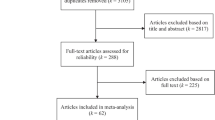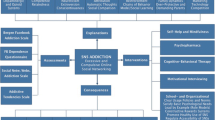Abstract
The Problem Gambling Severity Index (PGSI) has been the most frequently used instrument for prevalence studies for problem gambling in recent years. To date, there have been very few gambling studies among Persian populations. The objective of the present study was to investigate the reliability and validity of the Persian version of the PGSI. The original version of the PGSI was translated and back-translated into Persian, followed by a pilot study. A sample of Iranian online gamblers (n = 858) was recruited utilizing social media platforms. Results showed that the Persian PGSI had excellent internal consistency (Cronbach’s alpha coefficient = 0.90; composite reliability = 0.91) and moderate test-retest reliability after 4–6 weeks using intraclass coefficient (0.41 with 95% CI [.34, .49]). The maximum likelihood confirmatory factor analysis for one-factor PGSI model fitted well (χ2/df = 2.81, CFI = .974, SRMR = .028, PCLOSE > .05, RMSEA = .057, 90% CI [.037, .077]). As for criterion-related validity, the Persian PGSI score correlated with the score on the Hospital Anxiety Depression Scale, which assesses depression (r = .54, p < .01) and anxiety (r = .40, p < .01). The Persian PGSI is a reliable and valid instrument for assessing the prevalence of problem gambling among Persian populations.


Similar content being viewed by others
Availability of Data and Material
The data that support the findings of this study are available on request from the corresponding author. The data are not publicly available due to privacy or ethical restrictions.
References
American Psychiatric Association. (2000). Diagnostic and statistical manual of mental disorders (fourth ed., text rev.). Washington, DC: Author.
American Psychiatric Association. (2013). Diagnostic and statistical manual of mental disorders (fifth ed.). Arlington: American Psychiatric Publishing.
Barrault, S., Bonnaire, C., & Herrmann, F. (2017). Anxiety, depression and emotion regulation among regular online poker players. Journal of Gambling Studies, 33(4), 1039–1050. https://doi.org/10.1007/s10899-017-9669-3.
Beaton, D. E., Bombardier, C., Guillemin, F., & Ferraz, M. B. (2000). Guidelines for the process of cross-cultural adaptation of self-report measures. Spine, 25(24), 3186–3191. https://doi.org/10.1097/00007632-200012150-00014.
Browne, M., Goodwin, B. C., & Rockloff, M. J. (2018). Validation of the short gambling harm screen (SGHS): a tool for assessment of harms from gambling. Journal of Gambling Studies, 34(2), 499–512. https://doi.org/10.1007/s10899-017-9698-y.
Calado, F., & Griffiths, M. D. (2016). Problem gambling worldwide: an update and systematic review of empirical research (2000-2015). Journal of Behavioral Addictions, 5(4), 592–613. https://doi.org/10.1556/2006.5.2016.073.
Calado, F., Alexandre, J., & Griffiths, M. D. (2017). Prevalence of Adolescent Problem Gambling: A Systematic Review of Recent Research. Journal of gambling studies, 33(2), 397–424. https://doi.org/10.1007/s10899-016-9627-5.
Calado, F., Alexandre, J., Rosenfeld, L., Pereira, R., & Griffiths, M. D. (2019). The efficacy of a gambling prevention program among high-school students. Journal of Gambling Studies, 36, 573–595. https://doi.org/10.1007/s10899-019-09908-2.
Colasante, E., Gori, M., Bastiani, L., Siciliano, V., Giordani, P., Grassi, M., & Molinaro, S. (2013). An assessment of the psychometric properties of italian version of CPGI. Journal of Gambling Studies, 29(4), 765–774. https://doi.org/10.1007/s10899-012-9331-z.
Comrey, A. L., & Lee, H. B. (2013). A first course in factor analysis (2nd ed.). Hoboken: Taylor and Francis.
Cowie, M. E., Stewart, S. H., Salmon, J., Collins, P., Al-Hamdani, M., Boffo, M., & Wiers, R. W. (2017). Distorted beliefs about luck and skill and their relation to gambling problems and gambling behaviour in Dutch gamblers. Frontiers in Psychology, 8, 2245. https://doi.org/10.3389/fpsyg.2017.02245.
Derevensky, J. L., Shek, D. T. ., & Merrick, J. (2011). . Berlin: de Gruyter https://doi.org/10.1515/9783110255690.
Ferris, J., & Wynne, H. (2001). The Canadian Problem Gambling Index: final report. Ottawa: Canadian Centre on Substance Abuse. https://doi.org/10.1007/s10899-010-9224-y.
Gambling Commission (2019). Gambling participation in 2018: Behaviour, awareness and attitudes Annual report. 4–53. https://www.gamblingcommission.gov.uk/PDF/survey-data/Gambling-participation-in-2018-behaviour-awareness-and-attitudes.pdf.
González-Roz, A., Fernández-Hermida, J. R., Weidberg, S., Martínez-Loredo, V., & Secades-Villa, R. (2017). Prevalence of problem gambling among adolescents: a comparison across modes of access, gambling activities, and levels of severity. Journal of Gambling Studies, 33(2), 371–382. https://doi.org/10.1007/s10899-016-9652-4.
Hair, J. F., Babin, B. J., Anderson, R. E., & Black, W. C. (2018). Multivariate data analysis (8th ed.). Boston: Cengage Learning. https://doi.org/10.1002/9781119409137.ch4.
Heinz, A., Romanczuk-Seiferth, N., & Potenza, M. N. (2019). Gambling disorder. Cham: Springer Nature. https://doi.org/10.1007/978-3-030-03060-5.
Henseler, J., Hubona, G., & Ray, P. A. (2016). Using PLS path modeling in new technology research: updated guidelines. Industrial Management & Data Systems, 116(1), 2–20. https://doi.org/10.1108/imds-09-2015-0382.
Hu, L. T., & Bentler, P. M. (1999). Cutoff criteria for fit indexes in covariance structure analysis: conventional criteria versus new alternatives. Structural Equation Modeling, 6(1), 1–55. https://doi.org/10.1080/10705519909540118.
Hubert, P., & Griffiths, M. D. (2018). A comparison of online versus offline gambling harm in Portuguese pathological gamblers: an empirical study. International Journal of Mental Health and Addiction, 16(5), 1219–1237. https://doi.org/10.1007/s11469-017-9846-8.
Jonsson, J. (2019). Preventing problem gambling: focus on overconsumption. Doctoral dissertation: Department of Psychology, Stockholm University, Stockholm.
Killick, E. A., & Griffiths, M. D. (2019). In-play sports betting: a scoping study. International Journal of Mental Health and Addiction, 17(6), 1456–1495. https://doi.org/10.1007/s11469-018-9896-6.
Latvala, T., Lintonen, T., & Konu, A. (2019). Public health effects of gambling - debate on a conceptual model. BMC Public Health, 19(1), 1–16. https://doi.org/10.1186/s12889-019-7391-z.
Lesieur, H. R., & Blume, S. B. (1987). The South Oaks Gambling Screen (SOGS): a new instrument for the identification of pathological gamblers. American Journal of Psychiatry, 144, 1184–1188. https://doi.org/10.1176/ajp.144.9.1184.
Loo, J. M. Y., Oei, T. P. S., & Raylu, N. (2011). Psychometric evaluation of the problem gambling severity index-chinese version (PGSI-C). Journal of Gambling Studies, 27(3), 453–466. https://doi.org/10.1007/s10899-010-9221-1.
Lopez-Gonzalez, H., Estévez, A., & Griffiths, M. D. (2018). Spanish validation of the Problem Gambling Severity Index: a confirmatory factor analysis with sports bettors. Journal of Behavioral Addictions, 7(3), 814–820. https://doi.org/10.1556/2006.7.2018.84.
Maarefvand, M., Mardaneh-Jobehdar, M., Ghiabi, M., Rafimanesh, H., Mohammadi, A., Morshedi, Z., Ajami, M., Khubchandani, J., & Hosseinzadeh, S. (2019). Designing and evaluating the validity and reliability of the Persian gambling disorder screening questionnaire. Addiction & Health, 11(2), 110–119. https://doi.org/10.22122/ahj.v11i2.235.
McCormack, A., Shorter, G. W., & Griffiths, M. D. (2013). An examination of participation in online gambling activities and the relationship with problem gambling. Journal of Behavioral Addictions, 2(1), 31–41. https://doi.org/10.1556/JBA.2.2013.1.5
McRobert, C. J., Hill, J. C., Smale, T., Hay, E. M., & van der Windt, D. A. (2018). A multi-modal recruitment strategy using social media and internet-mediated methods to recruit a multidisciplinary, international sample of clinicians to an online research study. PLoS One, 13(7), e0200184. https://doi.org/10.1371/journal.pone.0200184.
Montazeri, A., Vahdaninia, M., Ebrahimi, M., & Jarvandi, S. (2003). The hospital anxiety and depression scale (HADS): translation and validation study of the Iranian version. Health and Quality of Life Outcomes, 1, 1–5. https://doi.org/10.1186/1477-7525-1-14.
Newall, P. W. S., Moodie, C., Reith, G., Stead, M., Critchlow, N., Morgan, A., & Dobbie, F. (2019). Gambling marketing from 2014 to 2018: a literature review. Current Addiction Reports, 6(2), 49–56. https://doi.org/10.1007/s40429-019-00239-1.
Olason, D. T., Kristjansdottir, E., Einarsdottir, H., Haraldsson, H., Bjarnason, G., & Derevensky, J. L. (2010). Internet gambling and problem gambling among 13 to 18 year old adolescents in Iceland. International Journal of Mental Health and Addiction, 9(3), 257–263. https://doi.org/10.1007/s11469-010-9280-7.
Orford, J., Wardle, H., Griffiths, M. D., Sproston, K., & Erens, B. (2010). PGSI and DSM-IV in the 2007 British Gambling Prevalence Survey: reliability, item response, factor structure and inter-scale agreement. International Gambling Studies, 10, 31–44. https://doi.org/10.1080/14459790903567132.
Otto, J. L., Smolenski, D. J., Garvey Wilson, A. L., Evatt, D. P., Campbell, M. S., Beech, E. H., Workman, D. E., Morgan, R. L., O'Gallagher, K., & Belsher, B. E. (2020). A systematic review evaluating screening instruments for gambling disorder finds lack of adequate evidence. Journal of Clinical Epidemiology, 120, 86–93. https://doi.org/10.1016/j.jclinepi.2019.12.022.
So, R., Matsushita, S., Kishimoto, S., & Furukawa, T. A. (2019). Development and validation of the Japanese version of the Problem Gambling Severity Index. Addictive Behaviors, 98, 105987. https://doi.org/10.1016/j.addbeh.2019.05.011.
Stevens, M., & Young, M. (2008). Gambling screens and problem gambling estimates: a parallel psychometric assessment of the South Oaks Gambling Screen and the Canadian Problem Gambling Index. Gambling Research, 20(1), 13–36.
Stinchfield, R. (2013). A review of problem gambling assessment instruments and brief screens. In D. C. S. Richard, A. Blaszczynski, & L. Nower (Eds.), The Wiley-Blackwell handbook of disordered gambling (pp. 165–203). Chichester: Wiley. https://doi.org/10.1002/9781118316078.
Tabachnick, B. G., & Fidell, L. S. (2014). Using multivariate statistics 6thedition. Harlow: Pearson Education.
Volberg, R. A., Gupta, R., Griffiths, M. D., Ólason, D. T., & Delfabbro, P. (2010). An international perspective on youth gambling prevalence studies. International Journal of Adolescent Medicine and Health, 22(1), 3–38. https://doi.org/10.1515/9783110255690.21.
Wardle, H., Reith, G., Langham, E., & Rogers, R. D. (2019). Gambling and public health: we need policy action to prevent harm. BMJ, 365(1–5), l1807. https://doi.org/10.1136/bmj.l1807.
Welte, J. W., Barnes, G. M., Tidwell, M. C. O., & Wieczorek, W. F. (2017). Predictors of problem gambling in the U.S. Journal of Gambling Studies, 33(2), 327–342. https://doi.org/10.1007/s10899-016-9639-1.
Zhang, X., Shi, J., & Tao, R. (2017). Substance and non-substance addiction. Advances in Experimental Medicine and Biology. Singapore: Springer Nature Singapore. https://doi.org/10.1007/978-981-10-5562-1.
Zigmond, A. S., & Snaith, R. P. (1983). The hospital anxiety and depression scale. Acta Psychiatrica Scandinavica, 67(6), 361–370. https://doi.org/10.1111/j.1600-0447.1983.tb09716.x.
Funding
The authors received no financial support for the research, authorship, and/or publication of this article.
Author information
Authors and Affiliations
Corresponding author
Ethics declarations
Ethics
Ethics approval was granted by the research team’s Institutional Review Board (IRB) and the study was carried out according the Declaration of Helsinki guidelines. The IRB reviewed the research protocol to ensure participant confidentiality, sampling, and obtaining inform consent.
Conflict of Interest
The authors (apart from MDG) declare no potential conflicts of interest with respect to the research, authorship, and/or publication of this article. MDG’s university currently receives funding from Norsk Tipping (the gambling operator owned by the Norwegian Government) for gambling-related research. MDG has received funding for a number of research projects in the area of gambling education for young people, social responsibility in gambling and gambling treatment from Gamble Aware (formerly the Responsibility in Gambling Trust), a charitable body which funds its research program based on donations from the gambling industry. MDG also undertakes consultancy for various gaming companies in the area of social responsibility in gambling.
Additional information
Publisher’s Note
Springer Nature remains neutral with regard to jurisdictional claims in published maps and institutional affiliations.
Rights and permissions
About this article
Cite this article
Griffiths, M.D., Nazari, N. Psychometric Validation of the Persian Version of the Problem Gambling Severity Index. Int J Ment Health Addiction 19, 2411–2422 (2021). https://doi.org/10.1007/s11469-020-00336-7
Published:
Issue Date:
DOI: https://doi.org/10.1007/s11469-020-00336-7




